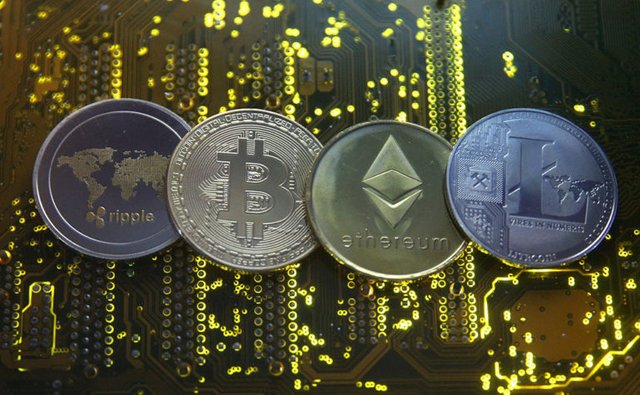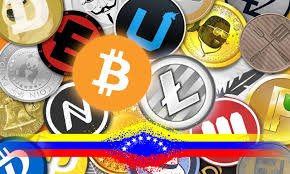**IMPACTS OF CRYPTOMONEY ON THE WORLD ECONOMY**

Fuente: Google
The rise of cryptomonedas is unstoppable at the dawn of 2018, just under 10 years after Bitcoin burst onto the financial scene and established itself as the most popular of all digital coins.
The financial systems of the world and Venezuela are today in the preamble of a very likely turnaround. This therefore implies substantial changes in the fabric of the real economy both globally and locally. Trying to be as pedagogical as possible and to distance ourselves somewhat from the heavy technical language that is imposed on these issues, we try to make some approximations to what could come in the world that cryptoactives point out.
Potential impacts of cryptomonets on the global environment
1. Back to the days of mercantilism? The beginnings of modern banking do not coincidentally go back to the time when gold and silver plundered from America saturated Europe. Mercantilism came from the hand of private individuals, who minted gold and silver coins, thus creating their own stamps and giving them an exchange value. Before the constitution of nation-states and before the existence of central banks, monetary issuance was in the hands of private individuals. Thus, in this way, but with the technologies and conditions of our time, thousands of cryptomes have been developed through the sponsorship of individuals or associated groups that have developed cryptographic platforms and networks, creating "out of nothing", or rather, through digital mining, units of digital currency that, according to their price, have an exchange value for other real currencies, goods or services.
2. The shaking of conventional banking. The "anarcho-capitalist" sense of the crypto-capitalist world is transversal and clearly palpable. Driven by the desire for profit (as in any financial or parafinancial structure in the capitalist world), the activism of digital currencies points to a lack of knowledge, a shuddering and an evasion of conventional banking mechanisms, which are essentially intermediaries that profit from commissions for the management of money and financial assets that are the property of users. The "cryptobanking" or system of free networks for the exchange of digital currencies has brought together investors who reside in conventional banking, who see attributes in the world of virtual currencies to also make a profit but escape from banks.
3. The Blockchain and the security mechanisms. Banking is what it has been for the sense of financial security and protection of the financial assets of its customers and users. That logic comes from the times of mercantilism, when a wealthy man who arrived from America with golden chests left him to the banker of the port to travel and protect his wealth from the roads full of bandits. In return he received a paper, with which he arrived in the destination city to exchange it for almost the same amount of gold he had left in port. The key word for all traditional banking is "trust", despite the frauds, bankruptcies and collapses that have marked bankers. The key word for emerging alternative digital banking is Blockchain.
Blockchain technology is already beginning to reinvent the infrastructure for global finance. It is based on a distributed, consensus-oriented digital book that facilitates and maintains a record of all historical transactions, without the need for a third party. Transparent exchange processes. According to James Sinclair, marketing manager of Trade Finance Global, "it is a concept that could revolutionize global trade and challenge the existence and purpose of intermediaries such as commercial banks and brokers.
4. A refuge for storms and crises. It was precisely when the financial crisis of 2008 broke out that the cryptomoney appeared, in particular, it was Bitcoin that opened the doors of a world completely unknown until now. It was then presented as an alternative to the traditional currencies, which had been devalued considerably due to the crisis and a new digital system was beginning to expand, with the possibility that the holders of monetary assets (money) could safeguard their capital in cryptoactives and not see it affected by the consequences produced by that crisis.
In today's financial world, the refuge of the holders of dollars is common, in physical assets such as gold and oil, precisely to overcome the spasms and ups and downs of that currency. Kryptomaterials are increasingly being used for these purposes and, in essence, could have a significant and collateral impact on the price of traditional shelter goods (gold and oil).
5. A more parasitic capitalism. A young Finn bought many Bitcoins in 2010 for the ridiculous price of $10. By 2017, its investment is equivalent to 10 million dollars, as a bubble was created around the value of this digital currency and it began to be quoted for tens of thousands of dollars per unit. By this example, the "adventure" of investment in cryptom coins and digital mining is identical to the meaning of the California "gold rush" of the 19th century. The meaning of'mining' is almost the same. The global capitalist system, which today is largely supported by paper assets, can migrate rapidly to this new episode of the inorganic economy. This is where the risks and "bubbles" that can be created in crypto-world come from.

6. Anyone can be a digital banker, or have their own washing machine. Virtual currencies depend on themselves and on users. They themselves are a bank and the money they have can be moved at will, according to the transactions they want to make at any given time. Thus, little by little, kryptomonedas have made a place in society and, nowadays, many users make use of these cryptocurrencies to maintain their own capital, without so many government regulations in many countries.
A weak side of cryptomonedas is that, through them, it is possible to legitimize capital from illicit activities. This means that the purchase of cryptom coins or large-scale mining (through'mining farms') is also likely to be boosted in some cases by factors outside the law. For the global financial system and governments, this is a matter of concern. We are talking about the incorporation into the real economy (by means of digital means) of enormous resources, which on other occasions are going to be given to tax havens at the expense of large commissions and corruption gangs. A lot of bankers and politicians don't like this.
7. The legitimation of cryptomoney from international bodies. In a review of the Venezuelan newspaper El Correo del Orinoco, details of a specialized report by the Economic Commission for Latin America and the Caribbean (ECLAC) of the United Nations (UN), which evaluated the advantages of cryptomoney for the Latin American and Caribbean region and its use in solving problems in the payment systems of Caribbean countries, were published. The study was published in January 2016 and was conducted by expert Shiva Bissessar, technical director of Pinaka Technology Solutions and a member of The Internet Society (ISOC), an international non-profit organization that promotes Internet use and access.
One of the most notable aspects of the ECLAC report is that it "recommends that the countries of the region encourage the exploration of cryptomoney with the aim of adapting to financial technology and becoming a pillar for the region in this field".
"Given the deficiencies in the infrastructure of sub-regional payment methods, and the need to increase participation in the digital economy, it is the duty of Latin American and Caribbean authorities to examine the opportunities for innovation offered by kryptomoney," Bissessar said in his report for ECLAC.
Cryptomonedas, like Petro, open up possibilities beyond the current global financial system.
8. How do cryptomonets work outside the computer? In European countries where progress has been made in incorporating cryptoactives into the real economy, operations such as going to a specific Bitcoin ATM and exchanging this digital currency for dollars or physical euros are possible. Payments are also becoming increasingly common for loans for services between private individuals in digital currencies, without touching a common currency, as well as payments for goods between small, medium and large enterprises.
In Africa, initiatives are already underway to establish mobile payment and remittance networks based on cryptomoney. Since 2015, the Central Bank of Barbados has already pointed out the need to place part of its international reserves in kryptom currencies, according to a document prepared by economists Winston Moore and Jeremy Stephen, in addition to considering the creation of a fund with digital money.
On the other hand, in Santo Domingo, capital of the Dominican Republic, three ATMs for cryptomonedas were already accounted for at the end of 2017. These ATMs belong to the company that makes them: Lamassu. For now, they only purchase Bitcoins using Dominican pesos in exchange for commissions ranging from 6% to 8%, but it is expected that in the near future they will be able to exchange digital currencies for US dollars.
These examples demonstrate the use of cryptoactives by de facto transforming traditional financial relationships and facilitating networks for the exchange of virtual currencies for goods and services between individuals, from individuals to corporations.
9. Adapt or perish? Countries and their governments have divided positions on the issue of cryptomoney. The big coincidence is that everyone assumes them as the end of the financial world as we know it, either because crypto-currency will transform banking or because it can also lead to disaster. Countries such as Japan, France, Uruguay and Russia have the position to regulate these activities, while others such as China remain cautious. Banks are moving to adapt to these new systems and there are strong lobbies against governments to recognize and regulate these types of activities. Venezuela is a country with an active role in the regularization of cryptography and has also launched Petro, a state-owned cryptomoney, with support in energy and mineral assets.

Venezuela is already on its way to adaptation.
Hi. I like your content! I just upvoted you and follow you! Can we be friends? I interested cryptocurrency and trading.
Hey, buddy. Thank you, of course we can be friends. I like this world too. I'll start following you.